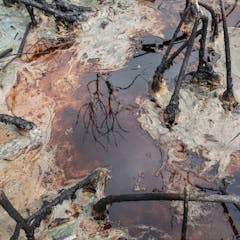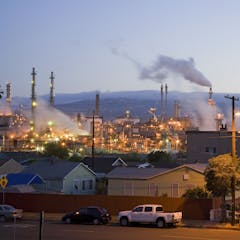
Artículos sobre Pollution
Mostrando 81 - 100 de 470 artículos

A new study reveals wide disparities among state-issued Clean Water Act fines, and even among federal fines from regions to region. A law professor explains why it may be illegal.

By washing our clothes, we release microfibres into the environment which are then ingested by marine animals.

It’s far easier to see how the stock market is doing than it is to find out the global price of carbon. That has to change.

Ghana needs improved supply systems to expand the use of clean fuels.

Destructive mining in Congo’s protected areas is rampant because it generates money for citizens, officials and armed groups.

Toxic synthetic chemicals, called PFAS, are a serious threat to humans and wildlife – but many people are unaware of them.

We cannot think of nature as something set aside in wildernesses, far from human activity. We need to conserve some elements of nature everywhere, including in the cities we live in.

New research reveals that the London Underground is polluted with small particles which may carry negative health effects for humans.

Most beaches along Durban’s coastline have critical E. coli levels above acceptable safety levels and should be considered a public health hazard.

A new report by the UK’s Chief Medical Officer sets out what must happen.

Vendors are continuously exposed to outdoor air pollution from traffic or automotive emissions and cooking fuels such as gas and open fires.

Hydrogen cars were heralded as an avenue towards universal green motoring, but progress has stalled in recent years.

A new survey has revealed an alarming deterioration in the health of the River Thames ecosystem – but some of the recorded changes may be the result of a cleaner river.

Many countries export their plastic waste abroad – but the mismanagement of this plastic waste is one of the leading causes of plastic pollution in nature.

Adequate wastewater treatment systems are crucial to ensure that wastewater from the oil industry does less damage.

The decision by African ministers of environment to end open waste burning will not only save lives but also open up new income streams.

Does the Global North have a moral responsibility to protect and compensate those in the Global South that disproportionately bear the brunt of climate change devastation?

Poor communities of color have spent decades battling US industrial and agricultural pollution. A new EPA office is designed to support their struggle, but history suggests reason for caution.

Offsetting carbon emissions sounds great. In practice, it’s often used to maintain the high-emissions status quo.

A mass die-off of crustaceans occurred on England’s north-east coast last autumn – the government’s explanation of the cause is unlikely to be true.
